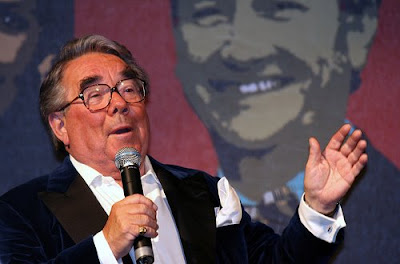I hate having my hair cut. It's not the cut itself that bothers me, but the prospect of having either an agonizingly stilted conversation with somebody or a long, awkward silence.
I tried going to a few barbers, but after some haircuts that left me looking like a Serbian war criminal, I decided to patronise
Toni and Guy. Their haircuts are very good, but in order to justify their exhorbitant prices they extend the process from a barber's ten minutes to a half hour ordeal of hair washing, head massages, coffee and small talk.
The staff at
Toni and Guy all seem young and beautiful and when I walk through the door, I always feel as if they're thinking 'What are
you doing here?'.
To compound the sense of alienation, they play music at a volume that rearranges your internal organs and makes you feel old and boring. To call it background music would be a mistake. It's foreground music and says that
Toni and Guy is part of a wider culture of hedonistic, sexy young people who spend a large part of their disposable income on looking good. What am
I doing here?
With
Ibiza Club Anthems at full throttle, I try to guess what would be an acceptable volume for speaking without seeming as if I'm some shouting loon. I always get it wrong and the conversation usually goes like this:
'
Hi (not hello, that's too stuffy for a 'happening' place like this).
I'd like a cut and blow dry please.'
BOOM BOOM BOOM BOOM
'
SORRY?'
(Oh God, did I say cut and blow job by mistake?) '
I'D LIKE A CUT AND BLOW DRY'
'OKAY. WHO D'YOU NORMALLY SEE?'
I'll mumble something about seeing different people each time, as I can never remember who cut my hair when I last had it cut, four months earlier. Then I'll sit down and wait for what seems like a geological era until someone appears with a black shroud that looks like something out of
The Seventh Seal.
We begin with the ritual of annointment. They always wash my hair three times, as if I'm some filthy old tramp that needs to be decontaminated and I try to see if the person next to me is also receiving the same treatment. Then comes the head massage. I know some men would pay good money to have a teenage girl's breasts rubbing against them as she caresses their head, butI find this level of intimacy with a stranger rather uncomfortable.
By the time I'm at the stage where I have the
consultation with my
stylist, I'm a broken man. I want to say '
Do what you like, just make it quick.' However, I feel obliged to take my hair as seriously as they seem to. Then the cut begins and with it, the dreaded small talk.
Sometimes, when I say I work in a bookshop that's enough to kill the conversation dead, but more often than not I will be asked what I think of the latest development in
Eastenders, where I'm going on holiday and whether I will be going clubbing that evening. Clubbing? I want to say '
Do I look like the sort of person that will be going clubbing?'
One day, I discovered an Arab barber. He spoke virtually no English and the only thing he said was '
Wha'numma'youwan?' I had no idea what he was talking about, but picked three as it was my lucky number and ten minutes later I left with a reasonably good haircut.
Sadly I left the town of my Arabian barber and have spent the last six months growing my hair to the point where I have become feral. I quite liked it, but my wife said that people would think I was letting myself go, so last Friday I trawled the streets of Lewes in search of a cheap, decent haircut.
Success! I not only got a decent haircut for £10, but also found a barber with a sense of humour and we spent 20 minutes having a laugh about celebrities. I told him about my encounters with Jordan and Petre Andre and also why very few people in the book trade have any time for Jeffery Archer. Then he told me about Ronnie Corbett.
I've always liked Ronnie Corbett and was dismayed to hear that my barber's mate, who works at Gatwick Airport, rates little Ronnie as one of the most difficult people he's ever had to deal with. When the Corbster flies in, the staff apparently draw lots to decide who will serve him. I wished I hadn't been told this. I liked Ronnie Corbett, the armchair raconteur and tireless fundraiser for charity.

But back to the subject of hair, you really can't beat a good barber. They are the taxi drivers of the scalp. After ten minutes or so of putting the world to rights I feel at one with my fellow man and far more relaxed than I ever had after an Indian head masage.








